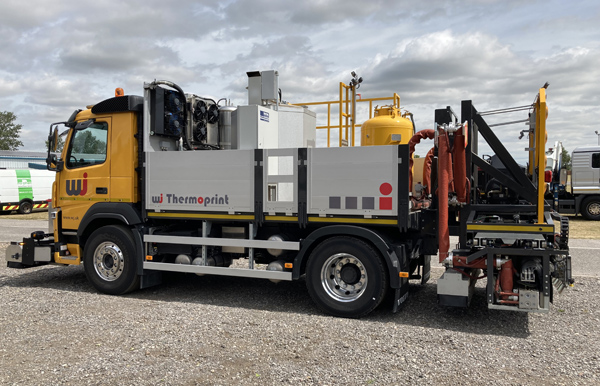WJ has made a major safety breakthrough by further removing workers from the carriageway, in a successful trial of its new automated ThermoPrint system on the strategic road network.
ThermoPrint's onboard technology has all UK road marking symbols programmed into the system, reducing the need for manual labour. In the past, some thermoplastic road markings, including letters, arrows, and symbols, required manual application using hand moulds.
WJ said its 'advanced application equipment and operating system have eliminated this century-old practice', removing operatives from the highway as well as manual handling risks such as potential burns.
ThermPrint was launched this year and has now been trialled on the A47 near Postwick in National Highways' eastern region, where the machine was used to install an arrow and ‘All Other Routes’ signage, as well as refresh on existing arrow markings.

John Sunderland, regional director for Ringway, which operates in the area said that following the trial 'we are looking at further implementation opportunities trials across all our contracts using this technology in the future'.
'This trial is instrumental in supporting health and safety improvements, thereby reducing the risk to our operators on the ground whilst providing transformational operational outcomes for customers,' he added.
ThermoPrint can also scan existing road markings and automatically match them to programmed designs, allowing immediate relaying of thermoplastic.
It also increases application speed by removing the need for pre-marking before installation.
Shaun Moseley, National Highways’ project manager for the area, said: 'Safety is an absolute priority for National Highways so any form of innovation that avoids people working directly on the carriageway is a positive step forward.
'The work completed by the ThermoPrint was of a high standard and we look forward to helping WJ develop their technology which has the potential to help the construction sector and contribute to making our roads safer.'
Andy Stubbs, managing director at WJ South, said: 'It’s always great to offer clients new and innovative technology that enhances safety. Now the trial has been completed, we’re confident that it will start to revolutionise the way road markings are installed in the UK.
'As well as delivering increased safety, it also offers efficiency benefits for our clients and we’re looking forward to rolling it out across other sites, as we look to improve the safety for all our people.'
Following the trial, WJ also tested the retro-reflectivity of the markings, which achieved dry results exceeding 250 mcd - this corresponds to an R4 category. The markings specialist said this was 'much higher than that of traditional hand-applied markings'.
The news follows the introduction of the WJ Guardian Road Stud Installation System, which also automated the delivery of works, taking operatives off the highway.




